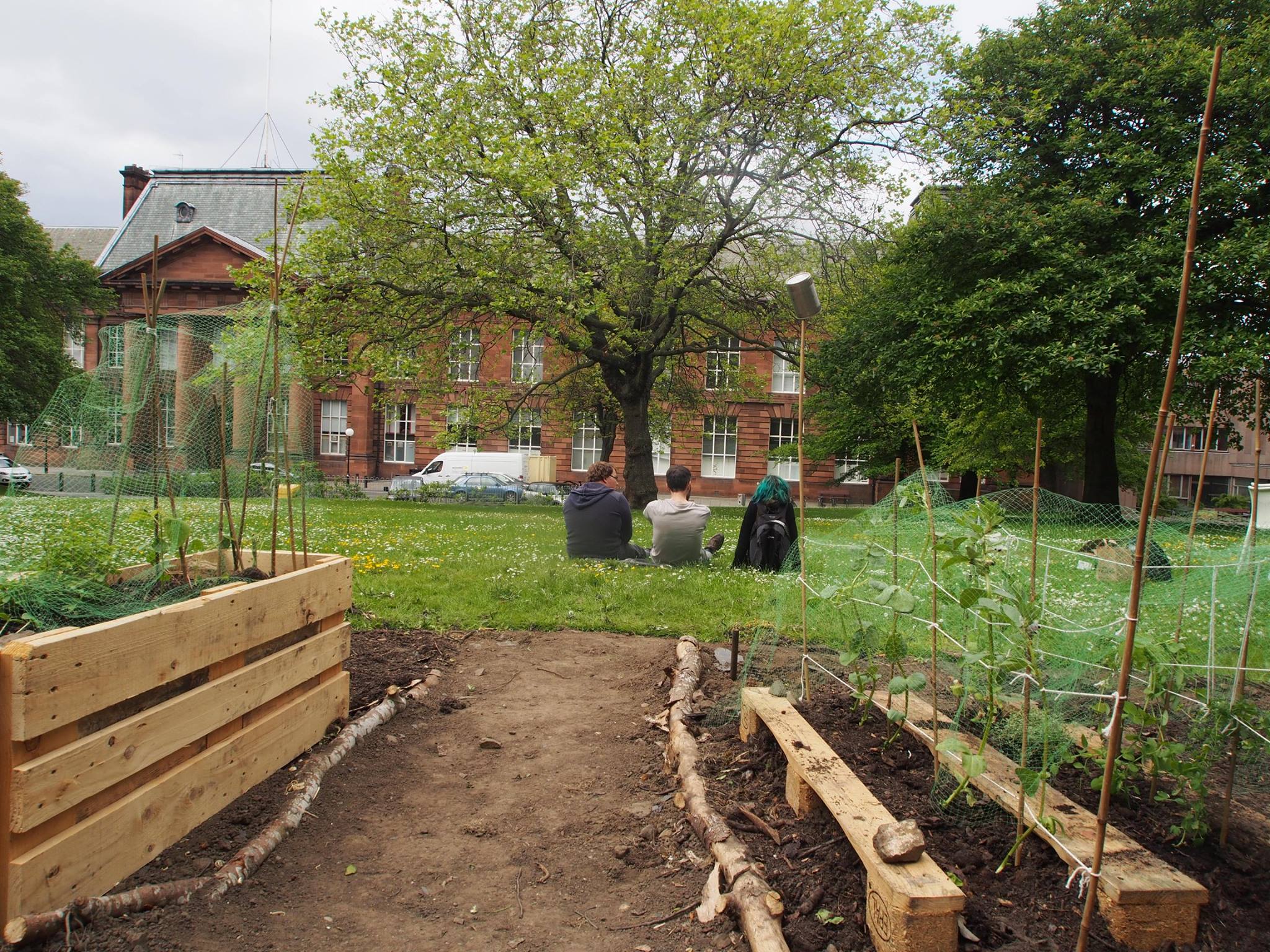Upcycling materials at the City Croft community garden

by Allison Palenske
Whole-systems thinking, closed loop and cradle-to-cradle design are common terms used within the discourse of the sustainability sector––within a theoretical framework these concepts seem viable and ideal in solving many issues arising from our current way of living. But on a much more tangible level, how can the process of creating a sustainable food-growing space reflect systems-thinking practicalities in design, build and maintenance?
The City Croft project at the Edinburgh College of Art is an attempt to test whole-systems thinking and cradle-to-cradle design within the context of a community garden. City Croft is a network of urban farmers who are involved with growing food, at varying levels of involvement, across Edinburgh. Our key focus is the development of a space, located within the Edinburgh College of Art courtyard, into a successful and sustainable food-growing garden. The idea is to enable as many people as possible to engage with nature and the origins of food, integrating artistic skills along the way.
Rebecca Willmott (MA Illustration) and myself (MFA Art, Space and Nature) started the City Croft project in February 2015. I am from a landscape architecture and community engagement background, and Rebecca is from a creative writing and illustration practice, so approaching the project as creatively as possible to uphold sustainable principles seemed like a natural fit.
We wanted to make the best use of materials already present within the university and community. Nearly all of our tools have been sourced through Freecycle and Freegle, web platforms that allow for exchange of goods at no cost. Not so long after beginning the project, we were also in touch with the Department for Social Responsibility and Sustainability, who had been contacted by the Waste Management team at the School of Chemistry. The School of Chemistry regularly accumulates an abundance of wood pallets as a result of product shipments––sturdy, well made and barely worn pallets that make an excellent building material!
Pallets have been a popular item for garden upcycling projects, with an abundance of design examples and instructions available online for planters, benches and vertical growing walls. Pallets marked with “HT” (for heat-treated) are safe for food growing, as were the ones we acquired from the School of Chemistry. We were quite happy to build some garden design elements out of upcycled pallets, taking inspiration from other projects we had seen to solve some of our own challenges of best utilising space and materials. The existing soil at the City Croft garden is not the most fertile or malleable, but with the addition of raised beds constructed from these pallets, we’ve been able to better manage and amend our growing medium. Some pallets have been used as they were originally found, simply submerged into the soil with shallow-rooting beans and peas planted in between the rows naturally created by the design of the pallets. We’ve even created a bench to encourage others to use the City Croft garden space.
We consider the City Croft garden an experiment and will be trying some other pallet designs through the summer, pushing boundaries of how food can be grown and hopefully providing some models for those urban gardeners who do not have much space, primarily looking at the possibilities of growing vertically. Our progress will continue to be documented via the City Croft blog.
The Department for Social Responsibility and Sustainability has enabled the development of this project, as we have received support in way of liaising with the appropriate contacts at the university to get this project growing. This assistance and encouragement has proven to us that growing food on campus is possible, and could play a much bigger role in the future of the University of Edinburgh. The process of sourcing materials through the university has also proven to us the abundance of resources that are waiting to be repurposed through this network, with just a bit of communication and transportation across short distances!
We hope the City Croft project will prove to be sustainable through future generations of students and will help build a community within ECA and the wider university of individuals who are interested and would like to become part of the Edinburgh Edible Campus initiative, regardless of their level of experience or knowledge! Through this diversity of experience we can begin to foster a more resilient space for growing food and sharing ideas.
For more information please email citycroftedinburgh@gmail.com







Recent comments